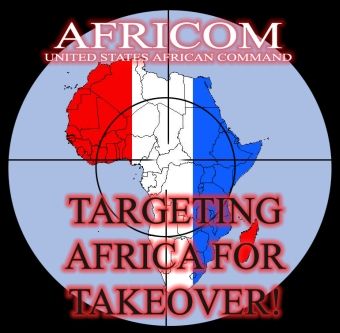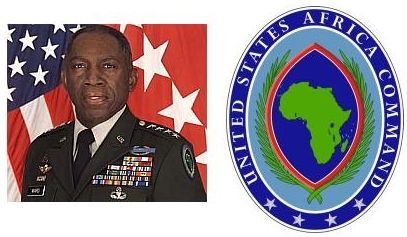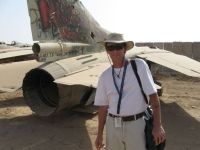

From: Berhane Habtemariam (Berhane.Habtemariam@gmx.de)
Date: Thu May 20 2010 - 08:24:54 EDT
Questions Surround Third U.S. War Theater: AFRICOM
How much do you know about U.S. War Theater number 3?
20.05.2010
http://www.salem-news.com/articles/may182010/african-tale-tk.php
Could Removal of U.S. Support Shift Iraq's Peaceful Balance?
Video: http://www.youtube.com/watch?v=1kdi7j0edww&feature=player_embedded#!
Exclusive Salem-News.com video clip from Sudan of rioting in al Fashir,
after recent U.S. backed reelection of genocidal henchman Omar al Bashir
Video: http://www.youtube.com/watch?v=ptY4oqLCxWA&feature=player_embedded
Salem-News.com
Courtesy: theblackchannel.net
(SALEM, Ore.) - Americans are keenly aware that their national and state
troops have been engaged in bitter, protracted wars in Afghanistan and Iraq
for many years. But few are equally knowledgeable of the third U.S. war
'theater' as they are known, in Africa.
It truly is the WTC 7 of American wars; most people just have no idea.
In recent years, American corporate interests have completely invaded the
infrastructure of the African continent. It happened with the assistance
from the last Presidential administration, and the timely distraction of the
wars in Iraq and Afghanistan.
It's not colonizing, but the United States, now in all but one of Africa's
56 countries, has sewn the seeds of its interests. Regions known to contain
sought after material like uranium, are now fully open to American
exploitation, thanks to all of the signed agreements.
Morally bankrupt American companies like Monsanto are being set up to force
their "mad scientist" seeds created in labs to replace natural seeds and
food products, on poor farmers who already have no other option.
The United States proved to the world with the invasion of Iraq, that it is
willing to start and conduct war for the sake of business. The nation's last
leaders demonstrated that the U.S. is completely unpredictable, and capable
of launching world level conflict against a nation that is absolutely a zero
threat to the U.S. That nation is the broken country known as Iraq.
A place where America paid its enemies, then stopped paying them as soon as
the limelight from the positive press of a "surge" was over. I was in Iraq
during the end of the surge and it wasn't exactly pretty.
Talk about disillusioned people; welcome to Baghdad, where Sunni and Shi'ite
people were divided by Uncle Sam and forced to carry ID defining their
religious sect as walls were erected between neighborhoods, dividing the
populace for the first time in history. This will undoubtedly go down as an
example of how unsafe it is for the residents of any country to believe
promises the U.S. makes. The American notion of liberation, is simply a
death sentence to hundreds of thousands.
If I lived in Africa, I would be concerned, especially with the history of
the U.S. adopting, funding and praising allies like Hussein and bin Laden,
before turning around and bombing them into submission. Hell, the U.S. even
suckered Iraq into invading Iran during the 1980's; that led to the deaths
of countless thousands and years of violence and unrest between the two
countries. Some track record, and it continues.
The United States recently refused to aid Hmong refugees in Thailand, who
helped the U.S. during the Vietnam War. Also, the first Bush turned his back
on the Kurdish people after encouraging them to revolt during the first Gulf
War. Of course most Americans called Saddam Hussein's retaliation against
them a war crime, but he never came close to killing the number of innocent
people that Bush has his name fixed to.
Now, as the U.S. inserts its military presence in Africa, something vital is
missing. Traditionally the Americans are only there to help the oppressed,
the populations of the needy, or so we are raised to believe. Today there is
plenty of American help; help for its greedy corporate layout, help for the
shareholders, help for the top 2% of the country's wealthiest citizens. They
aren't complaining about this extreme yet quiet American presence in Africa.
Today in Africa, children are still starving, AIDS is raging, people are
dying in genocidal violence, and the U.S. is backing political henchmen,
seriously scary stuff. But, we have our access to uranium and other African
resources well under control.
Exclusive Salem-News.com video clip from Sudan of rioting in al Fashir,
after recent U.S. backed reelection of genocidal henchman Omar al Bashir
The needs of the American business world, "American interests abroad", are
clearly accounted for.
Most Americans are unaware of the massive political unrest that is violently
claiming the lives of hundreds of people on the African continent every day.
Our African Affairs Correspondent Alysha Atma has been covering the Sudan
elections through contacts on the scene, and the ensuing attack of
demonstrators who decried the supposed U.S. funded 'reelection' of the
country's genocidal Dictator al-Bashir. It is horrible, tragic and
systematic. Troops were going house to house to try to learn who in a
particular city, had sent the photos out to Salem-News.com.
The history of genocide in Africa in recent years, can largely be attributed
to the European colonization of yesterday. It was Germany that first moved
into Rwanda in the late 1800's. The Germans sided with the lighter
complected Tutsi people, and helped them on several occasions to fight
uprisings from inhabitants who were Hutu. By 1933, residents had to carry ID
cards that designated their tribal status.
1933; a year forever associated with the launch in Germany, of the Third
Reich. By this point in Rwanda's history however, Germany was out and
Belgium was in. That had come about as a result of Germany's loss of WW1.
Still, the light skin people of Rwanda were favored by the Europeans, and
animosity naturally grew.
Interestingly, one of the tragic realizations of the U.S. war in Iraq, is
that residents in Baghdad suddenly, for the first time, had to carry ID
cards designating them as Sunni or Shi'ite. Iraq, where dozens of civilians
continue to die in mass suicide bombings. Baghdad, a city divided with huge
walls installed by American contractors, to divide the residents by
religion. It obviously didn't help Rwanda, where multiple genocides have
taken place in recent years, some of the most horrific attacks on civilian
populations in recent history.
According to the U.S. government, the U.S. African Command (AFRICOM) was
installed to broaden American ability to bring peace to Africa. So far it
hasn't worked for a lot of Africans.
In fact, since the 6 February 2007 launch of AFRICOM, the United States has
actually 'taken sides' in this continent's complex political upheaval, and
the U.S. Special Envoy to Sudan, Scott Gration, decided to back the election
of Omar Hassan Ahmad al-Bashir (Arabic: ŕ„— Õ”š √Õ„Ō «Š»‘Ū—ż), the
'president' of Sudan and the head of the National Congress Party.
Right on cue, demonstrations in Sudan that called foul on the nation's
elections, perceived as rigged, were attacked by forces loyal to Bashir.
Salem-News.com was the only agency in the world who had someone on the
ground there, the photos and video were taken as demonstrators were under
attack.
When former U.S. President Bush and Defense Secretary Robert Gates announced
the creation of U.S. Africa Command, they said the decision was the
culmination of, according to the AFRICOM Website, "a 10-year thought process
within the Department of Defense (DOD) acknowledging the emerging strategic
importance of Africa". The command operates under the leadership of General
William "Kip" Ward[1].
The statement recognized the need for "peace and stability" but also noted
the importance of, "the interests of the U.S. and international community".
There had only been a U.S. presence in three locations on the African
continent. Now there is reportedly a cooperative agreement between the U.S.
and all nations there except for Egypt.
"The creation of U.S. Africa Command enables DoD to better focus its
resources to support and enhance existing U.S. initiatives that help African
nations, the African Union, and the regional economic communities succeed.
It also provides African nations and regional organizations an integrated
DoD coordination point to help address security and related needs."
"Security" to a Palestinian or a Baghdad resident, can carry sinister
overtones. It is another simple term for enhanced military presence.
http://www.salem-news.com/gphotos/1274234385.jpgAccording to a mission
statement approved by the Secretary of Defense in May 2008:
"United States Africa Command, in concert
with other U.S. government agencies and
international partners, conducts sustained
security engagement through
military-to-military programs,
military-sponsored activities, and other
military operations as directed to promote
a stable and secure African environment in
support of U.S. foreign policy."
U.S. foreign policy of course is of a different nature than in previous
years. Today it involves unilateral strikes on nations like Iraq, constant
posturing toward unproven and undocumented threats of alleged nuclear weapon
development in Iran, two million dollars of U.S. taxpayer support for Israel
every day as that nation/state systematically attempts to eliminate the
native Palestinian people from their own land, enacting and increasing
apartheid laws clearly in violation of countless international laws.
That, is U.S. foreign policy these days. Along with Scott Gration's backing
of al Bashir. It hardly seems like advocacy for Africa. Based on the history
of western influence here, it is hard to visualize where an American
presence that is so military in nature, could be the needed answer.
And it is important to remember that Africa is a vast, diverse place. There
was dissent over the formation of AFRICOM, and one nation against it was
Nigeria. STRATFOR reported on 14 December 2007 that Nigerian President Umaru
Yaradua yielded on his government's opposition to the U.S. Africa Command
(AFRICOM).
On 15 May 2009, Online Journal reported from Asmara, Eritrea, that, "The USA
African Command (AFRICOM) is building their new African megabase in the tiny
Horn of African country of Djibouti. The first phase is costing $2 billion,
according to reports, and eventually another $4 billion will be spent. This
latest expansion of USA imperial might, this time on African soil, is
turning into a fiasco for the Pentagon and US State Department."
The Online Journal reporter, Thomas C. Mountain, considered himself 'the
last white man living in Eritrea' just one year ago,discussed how Ethiopia,
with the USAís instigation and funding, "invaded Somalia in Dec 2006 after
the Union of Islamic Courts began to defeat the Ethiopian/USA-backed Somali
warlords and started to build a new government is Somalia for the first time
since 1991."
The article cites how almost no one in the West seems to know that Ethiopia,
equipped and funded by the USA and other Western countries, started a war
with Eritrea in 1998 and carried out an invasion of Eritrea in 2000 in an
attempt to regain their former colony[3].
The deal for Ethiopia? With a little help from the West and particularly the
USA, gets a major port and international airport in Assab. This is a
strategic location, situated close the entrance to the Red Sea. Under the
arrangement, Ethiopia regains the use of Port Assab, something dear to the
heart of Ethiopian nationalists.
Wikipedia states:
"Prior to the creation of AFRICOM, three Unified Commands had divided
responsibility for U.S. military operations in Africa. The United States
Navyīs Naval Postgraduate School noted in January 2007 that U.S. policy
towards Africa, at least in the medium-term, looks to be largely defined by
international terrorism, the increasing importance of African oil to
American energy needs, and the dramatic expansion and improvement of
Sino-African relations since the turn of the century." [4]
Huffington Post writer Charles Rukuni, reported in January 2009, that Obama
had a lot of eyes from Africa watching, and waiting, to see what this black
U.S. President held for them in terms of real promise[5].
In his article, ďUnderstanding AFRICOMĒ Author Bryan Hunt, said, "the real
objective is the procurement and control of Africa's oil and its global
delivery system."
In the same article, US foreign policy towards Africa according to Letitia
Lawson seems to be largely defined by "international terrorism, the
increasing importance of African oil to American energy needs, and the
dramatic expansion and improvement of Sino-African relations".
Alexander von Peleske said the establishment of AFRICOM means that U.S.
consumption of African oil will rise from 18 percent, to 25 percent by 2015.
The specific information is attibuted to the African Oil Policy Initiative
Group report.
It is hard to get excited about practices that so closely resemble the
exploitation of yesterday. This is an informational report, meant to serve
as an introduction to Americans who know nothing about their nation's
current role in Africa.
[1] <http://www.iasps.org/strategic/africawhitepaper.pdf> African Oil: A
Priority for U.S. National Security and African Development
[2] <http://en.wikipedia.org/wiki/United_States_Africa_Command> United
States Africa Command - From Wikipedia, the free encyclopedia
[3]
<http://www.nps.edu/Academics/Centers/CCC/publications/OnlineJournal/index.h
tml> Naval Postgraduate School Center on Contemporary Conflict Strategic
Insights
[4]
<http://racismandnationalconsciousnessnews.wordpress.com/2009/05/16/africom%
E2%80%99s-6-billion-fiasco-in-djibouti-thomas-c-mountain/#more-1984>
AFRICOMís $6 billion fiasco in Djibouti - Thomas C. Mountain Online Journal
[5]
<http://www.huffingtonpost.com/groundreport/as-opposition-grows-afric_b_1566
54.html> As Opposition Grows, AFRICOM Could Be A Headache For Obama
====================================
http://www.salem-news.com/gphotos/1269513117.jpgTim King is a former U.S.
Marine with twenty years of experience on the west coast as a television
news producer, photojournalist, reporter and assignment editor. In addition
to his role as a war correspondent, this Los Angeles native serves as
Salem-News.com's Executive News Editor. Tim spent the winter of 2006/07
covering the war in Afghanistan, and he was in Iraq over the summer of 2008,
reporting from the war while embedded with both the U.S. Army and the
Marines.
Tim holds numerous awards for reporting, photography, writing and editing,
including the Oregon AP Award for Spot News Photographer of the Year (2004),
first place Electronic Media Award in Spot News, Las Vegas, (1998), Oregon
AP Cooperation Award (1991); and several others including the 2005 Red Cross
Good Neighborhood Award for reporting. Serving the community in very real
terms, Salem-News.com is the nation's only truly independent high traffic
news Website. You can send Tim an email at this address:
<mailto:newsroom@salem-news.com> newsroom@salem-news.com



----[This List to be used for Eritrea Related News Only]----
